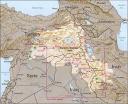Iraq has made a formal complaint over the Turkish bombardment of the Kurdish north.
The Turks have been shelling villages in Dohuk province and the city of Arbil, although the Turkish media reports the areas being targetted have largely been abandoned to Kurdish fighters.
In my last post on this topic, I noted how a cross-border incursion could have unpredictable and destabilising effects. It seems the Iraqi foreign ministry has come to the same conclusion. It has told the Turks that the artillery fire could “destabilise the region and could erode confidence between the two countries”.
The AP article linked to at the top of this post says the US has “opposed any unilateral action by Turkey for fear it would jeopardise the relative tranquility of northern Iraq”. However, I can not recall reading any such statement; at least not in recent times.
I am not an expert on this conflict, but I feel it has potentially widespread ramifications.
The Turks, in their eyes, have a legitimate security concern. The conflict with the Kurdish PKK has lead to tens of thousands of deaths over the last two decades. Turkey claims Iraqi Kurds are harbouring militants, who then slip over the frontier to launch attacks.
The Kurds also have legitimate grievances, such as cultural and political suppression. And we must always remain aware that the PKK is considered a terrorist group not just by Turkey, but by the US, NATO and EU. Their actions have caused the deaths and suffering of a great many civilians. They have been accused of grave human rights abuses.
Turkey fears an economically sound Kurdish region in Iraq — a territory that while not being independent outright would still possess great oil wealth — will lead to a major push among Turkish Kurds for union with their southern neighbours.
One might think that the Turks would welcome the departure of what it considers a restive ethnic group. However, the Kurds represent about 20% of the Turkish population and dwell in a broad swathe of territory in the nation’s southeast:
This is not a homogenous region. Many Turks live within what is generally referred to as Kurdistan (as do Arabs, Iranians, Armenians and many other groups). So the removal of this region from the political entity of Turkey would remove a great many Turks as well.
This would certainly be an economic blow. While there would be an accompanying reduction in spending on infrastructure, education, healthcare and the like, the sudden disappearance of 20 million people from the tax base would leave a major whole in government coffers.
But there are other factors, such as pride.
The Turkish government would not want to be seen as having abandoned many of its citizens to a new state (although there would always be the possibility of a population transfer, as was the case in India and Pakistan after their independence). Seldom are nations eager to give up national territory; historically human and state political ambition has always been more, more, more.
Security would be a further concern. Turkey would suddenly have a substantial, perhaps hostile nation on its southern and eastern borders. And Turkey does not formally recognise a Kurdish region within its state; this fluid situation would lead to further infighting over what would and would not be part of Kurdistan. It is possible that the Turks would view an independent Kurdish nation as a base for Kurdish rebels seeking to unify with Kurds still within Turkey.
There are solutions. A UN boundary commission is one, domestic referenda on a district-by-district basis is another. There are undoubtedly more which aren’t springing to mind right now.

1. Both Kurds and Iraqis live in the USA as Americains while being free to embrace and honor their ethnic origins. It is conceiveable that Kurds living in Turkey could likewise do so if they were to enjoy the same sort of rights as do Kurds living in the USA.
2. If the Kurds want to have their own nation they need to respect the Turkish border and stop causing unrest among the Turkish Kurds.
3. The world community , including Europeans, needs to become involved for mediation, input and support of a truce between the Kurds and the Turks.
GOOD FENCES MAKE GOOD NEIGHBORS.
1. Both Kurds and Iraqis live in the USA as Americains while being free to embrace and honor their ethnic origins. It is conceiveable that Kurds living in Turkey could likewise do so if they were to enjoy the same sort of rights as do Kurds living in the USA.
2. If the Kurds want to have their own nation they need to respect the Turkish border and stop causing unrest among the Turkish Kurds.
3. The world community , including Europeans, needs to become involved for mediation, input and support of a truce between the Kurds and the Turks.
GOOD FENCES MAKE GOOD NEIGHBORS.